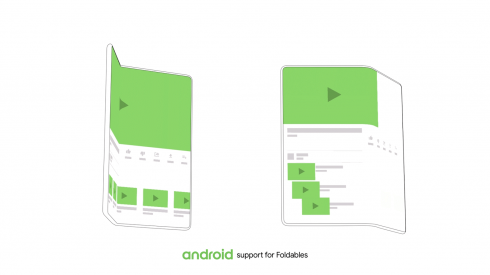
Google is looking to support the latest technologies in a series of new Android developer updates and features announced at its Android Dev Summit in Mountain View this week.
Some highlights included:
Support for devices with foldable screens
Android device makers are beginning to experiment with Foldables, which are screens that can bend and fold. When folded, the devices look like normal phones, but when unfolded the screen size is more similar to a tablet’s screen size. When unfolding, apps seamlessly transfer to the larger screen, Google explained.
The Android team is now working on optimizing Android for Foldables. It is also working to provide ways for developers to utilize them to create new experiences.
Support for Kotlin 1.3
The company announced that features of Kotlin 1.3, which was released last week, will be integrated into Kotlin-specific APIs.
New features include inline classes, unsigned numbers, and coroutine support. Multiplatform code that was previously written for Android or JVM can now target JavaScript and Native, allowing more parts of codebases to be reused on other platforms.
Navigation, Work Manager, and Android Slices
It is moving Navigation and Work Manager to beta this month. Navigation makes it easy to implement Android’s navigation principles in application, the company explained. A new Navigation Editor in Android Studio will create and edit the navigation architecture, eliminating navigation boilerplate and providing atomic navigation operations and easier animated transitions.
WorkManager offers a way to perform background tasks efficiently, selecting the proper solution based on the application state and device API level.
Android Slices are moving to public Search experiments as well. Slices are mini parts of apps that can show content and actions, allowing users to do things such as book a flight, play a video, or call a ride.
Android Studio 3.3 beta 3
Android Studio 3.3 has entered beta 3. The Android team has stated that there will be a strong focus on quality and fundamentals in the upcoming releases. It wants to focus on reducing the number of crashes, optimizing memory usage, and fixing user-impacting bugs.
It also announced that Android Studio will become an officially supported IDE on Chrome OS next year.
Android App Bundle now supports uncompressed native libraries
In an effort to mitigate the negatives of larger app sizes — such as lower install conversion rates, lower update rates, and higher uninstalls — Google launched a new publishing format called Android App Bundle. The new format serves only the code and resources necessary to run an app on a specific device.
According to Google, apps save an average of 35 percent in size compared to a universal APK.
App bundles will now support uncompressed native libraries, which will result in an eight percent reduction in size of apps that use native libraries.
“With dynamic feature modules, you can load any app functionality on demand instead of at install time. You don’t need to keep big features that are only used once, on every single device forever; dynamic features can be installed and uninstalled dynamically when your app requests them,” the Android development team wrote in a post.
In-app Updates API
To provide more controls that ensure users are running the latest version of your app, Google has launched an In-app Updates API.
The API will have two options:
- A full-screen experience where users will have to wait for the update to be applied before using the app
- A flexible update where users can keep using the app while the update is being applied.
Instant app improvements
It is also making it easier to adopt instant apps. Recently, it made using web URLs optional and raised the size limit on instant apps to 10MB for the Try Now button in the Play Store and web banners.
As part of Android Studio 3.3 beta, developers will now be able to build an instant-enabled app bundle, enabling them to build and deploy Instant and installed experiences from a single Android Studio project, as well as include them in a single Android App Bundle.






